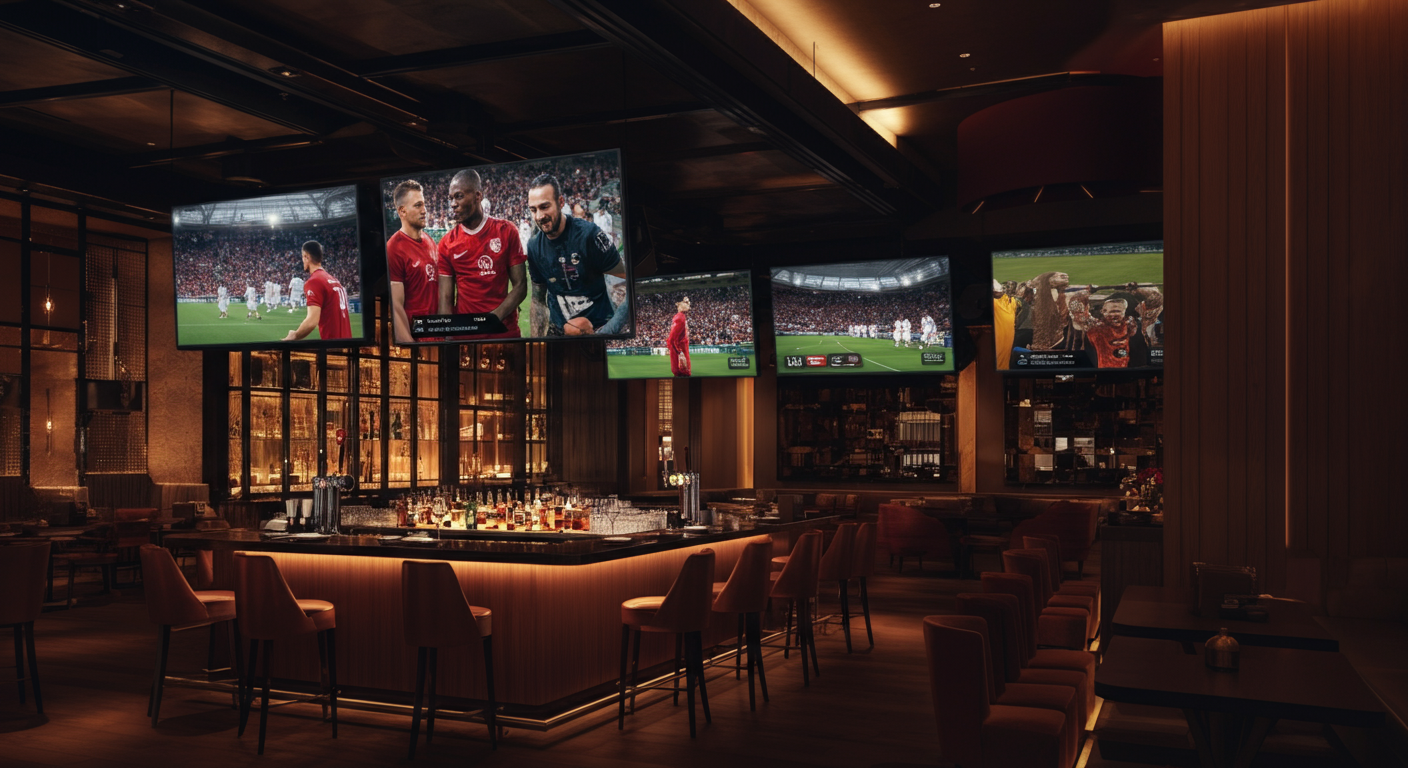In the dynamic world of hospitality and entertainment, businesses are constantly seeking innovative solutions to enhance their customer experience. For multi-location organizations, the challenge lies in selecting business solutions that not only meet individual site needs but also provide a cohesive and engaging experience across all venues. With the increasing demand for multi-location business solutions, understanding how to choose the right entertainment systems becomes essential.
Imagine walking into a bustling casino or a vibrant restaurant chain, where each location offers a seamless and unified entertainment experience. This is the power of selecting the right multi-location business solutions. Not only does it enhance the customer experience, but it also streamlines operations, ensuring consistency and quality across all sites. For businesses like casinos, bars, and restaurants, the right entertainment solution can be the difference between a memorable night out and a forgettable one.
At DLM Media, we understand the importance of high-quality content in commercial entertainment. Our commitment to providing exceptional service ensures that businesses can deliver the ultimate viewing experience to their patrons. As you explore the key factors in choosing entertainment solutions that can scale across multiple locations, you’ll discover how these solutions can transform the way customers interact with your brand.
Ready to dive deeper? In this blog post, we’ll explore the essential considerations for selecting multi-location business solutions and how they can enhance your customer experience. From understanding the legal aspects of commercial video programming to exploring the latest trends in entertainment systems, our guide will provide you with the insights needed to make informed decisions. Stay with us as we navigate the complexities of multi-location business solutions and unlock new possibilities for your venues.
Understanding Multi-Location Business Needs
In the fast-paced world of hospitality and entertainment, businesses with multiple locations face unique challenges. These challenges often revolve around maintaining a consistent customer experience and ensuring centralized management across all venues. As businesses expand, the complexity of operations increases, requiring robust solutions to manage diverse customer expectations and operational demands.
One of the primary concerns for multi-location businesses is delivering a uniform experience to customers, regardless of the location they visit. Consistency is crucial as it builds brand loyalty and enhances customer satisfaction. According to a study by PwC, 73% of consumers cite customer experience as an important factor in their purchasing decisions, highlighting the need for businesses to prioritize this aspect.
Identifying Common Challenges
Multi-location businesses encounter several common challenges that can hinder their operations and customer satisfaction. These challenges include:
- Inconsistent Customer Experience: Variability in service quality and product offerings across locations can lead to customer dissatisfaction.
- Operational Inefficiencies: Managing inventory, staff, and resources across multiple sites can be cumbersome without a centralized system.
- Communication Gaps: Ensuring effective communication between headquarters and individual locations is essential but often challenging.
- Data Management: Collecting and analyzing data from different locations can be complex, affecting decision-making processes.
Importance of Consistent Customer Experience
Providing a consistent customer experience is vital for multi-location businesses. It not only fosters customer loyalty but also strengthens the brand’s reputation. A consistent experience ensures that customers receive the same level of service and product quality, regardless of the location they visit. This uniformity is crucial for businesses aiming to build a strong brand identity.
For instance, a restaurant chain that offers the same menu and service standards across all locations is more likely to retain customers than one with varying offerings. As noted by McKinsey & Company, companies that excel at customer experience grow revenues 4% to 8% above their market.
Centralized Management for Efficiency
Centralized management is essential for the smooth operation of multi-location businesses. It allows for streamlined processes, better resource allocation, and improved decision-making. By centralizing management, businesses can ensure that all locations adhere to the same standards and protocols, reducing the risk of discrepancies.
Implementing a centralized management system can also enhance communication between locations and headquarters, facilitating the sharing of best practices and operational insights. This approach not only improves efficiency but also empowers local managers to focus on delivering exceptional customer experiences.
In conclusion, understanding and addressing the unique needs of multi-location businesses is crucial for success. By focusing on consistent customer experiences and centralized management, businesses can overcome common challenges and thrive in the competitive hospitality and entertainment industries. For more insights on how to enhance your multi-location business operations, explore additional resources on DLM Media.
Evaluating Entertainment Solutions for Multi-Location Businesses
When it comes to selecting multi-location business solutions, particularly in the realm of entertainment, there are several critical factors to consider. The right solution must not only enhance the customer experience but also ensure scalability and consistency across all locations. In this section, we will explore the key elements that businesses should evaluate when choosing entertainment solutions that can be implemented across multiple sites.
Technology plays a pivotal role in providing scalable entertainment solutions. As businesses expand their footprint, the ability to integrate and manage technology efficiently becomes paramount. The right technological infrastructure can streamline operations, improve customer engagement, and ensure a seamless experience across all venues.
Role of Technology in Scalable Solutions
Technology is the backbone of any scalable entertainment solution. It enables businesses to deliver consistent and high-quality experiences across multiple locations. For instance, cloud-based systems allow real-time updates and centralized control, ensuring that all sites are synchronized and operating efficiently. This not only reduces operational costs but also enhances the overall customer experience.
Successful implementations of scalable technology can be seen in various industries. For example, a restaurant chain might use a centralized digital signage system to display menus and promotions consistently across all branches. This ensures that customers receive the same information and experience, regardless of the location they visit.
Content Management and Customization
Content is a crucial component of any entertainment solution. Businesses must ensure that the content they provide is engaging and relevant to their audience. This involves not only selecting the right type of content but also ensuring that it can be easily customized for different locations.
For example, a casino might offer live sports broadcasts, music videos, and other entertainment options tailored to the preferences of its clientele. By using a centralized content management system, businesses can easily update and customize content to suit the unique needs of each location, enhancing customer engagement and satisfaction.
Enhancing Customer Engagement
Customer engagement is at the heart of any successful entertainment solution. Businesses must focus on creating interactive and immersive experiences that captivate their audience. This can be achieved through the use of advanced technologies such as virtual reality, augmented reality, and interactive displays.
For instance, a bar might implement interactive touchscreens that allow patrons to select music or participate in trivia games. These interactive elements not only enhance the entertainment experience but also encourage customers to spend more time and money at the venue.
In conclusion, evaluating entertainment solutions for multi-location businesses involves a careful consideration of technology, content, and customer engagement. By focusing on these key areas, businesses can ensure that they provide a consistent and engaging experience across all locations, ultimately driving customer satisfaction and loyalty.
Legal and Compliance Considerations
When it comes to selecting multi-location business solutions for unified entertainment, understanding the legal and compliance landscape is crucial. Businesses operating across multiple locations must navigate a myriad of regulations, from licensing requirements to data protection laws. These legal considerations are not just bureaucratic hurdles; they are essential for maintaining operational integrity and avoiding potential fines or legal disputes.
For businesses in the hospitality and entertainment sectors, compliance with local and national laws ensures that operations run smoothly and reputations remain untarnished. Let’s explore some of the key legal and compliance aspects that multi-location businesses need to consider.
Licensing Requirements
Licensing is a fundamental aspect of operating entertainment solutions across multiple locations. Each jurisdiction may have its own set of rules regarding the types of licenses required for broadcasting or streaming content. For instance, a casino in Nevada might need different licenses compared to a restaurant in New York.
It’s essential for businesses to understand these requirements and ensure that all necessary licenses are obtained and kept up to date. Failure to comply can result in hefty fines or even the shutdown of operations. Consulting with legal experts who specialize in entertainment law can provide valuable guidance and help navigate the complexities of licensing.
Data Protection and Privacy Laws
In today’s digital age, data protection is a critical concern for businesses, especially those operating in multiple locations. With varying laws such as the GDPR in Europe or the CCPA in California, businesses must ensure that customer data is handled with the utmost care and compliance.
Implementing robust data protection measures not only helps in complying with legal standards but also builds trust with customers. Businesses should invest in secure data management systems and train staff on data privacy protocols to mitigate risks associated with data breaches.
FAQ: Common Legal Questions
- What licenses are needed for broadcasting in multiple states? Each state may have different licensing requirements; consulting with a legal expert is advised to ensure compliance.
- How can businesses ensure compliance with data protection laws? Implementing comprehensive data management systems and regular staff training can help maintain compliance with laws like GDPR and CCPA.
- What are the penalties for non-compliance? Penalties can range from fines to operational shutdowns, depending on the severity of the violation and the jurisdiction.
Understanding and addressing these legal and compliance considerations is vital for businesses aiming to provide a seamless and lawful entertainment experience across multiple locations. By staying informed and proactive, businesses can avoid legal pitfalls and focus on delivering exceptional customer experiences.
Maximize Success with the Right Solutions
In the rapidly evolving hospitality and entertainment sectors, the right multi-location business solutions can be a game-changer. As we’ve explored, selecting scalable and compliant entertainment solutions is crucial for businesses looking to provide a consistent and engaging customer experience across various venues. By focusing on key aspects such as technology integration, content management, and customer engagement, businesses can create memorable experiences that drive loyalty and satisfaction.
To recap, consider the following essential elements when choosing your solutions:
- Technology Integration: Ensure that your systems are scalable and can be easily managed across all locations.
- Content Customization: Tailor entertainment content to suit the unique preferences of your clientele.
- Legal Compliance: Stay informed about licensing and data protection laws to avoid potential legal pitfalls.
- Customer Engagement: Implement interactive technologies that captivate and retain your audience.
By addressing these key areas, businesses can overcome the challenges of managing multiple locations and deliver a cohesive brand experience. As noted by industry leaders, a consistent customer experience not only enhances satisfaction but also strengthens brand loyalty, ultimately leading to increased revenue and growth.
At DLM Media, we are committed to helping you navigate the complexities of multi-location business solutions. Our expertise in commercial video programming ensures that you receive the best service and support tailored to your needs. If you’re ready to elevate your entertainment offerings and create unforgettable experiences for your customers, explore our solutions today.





